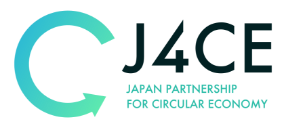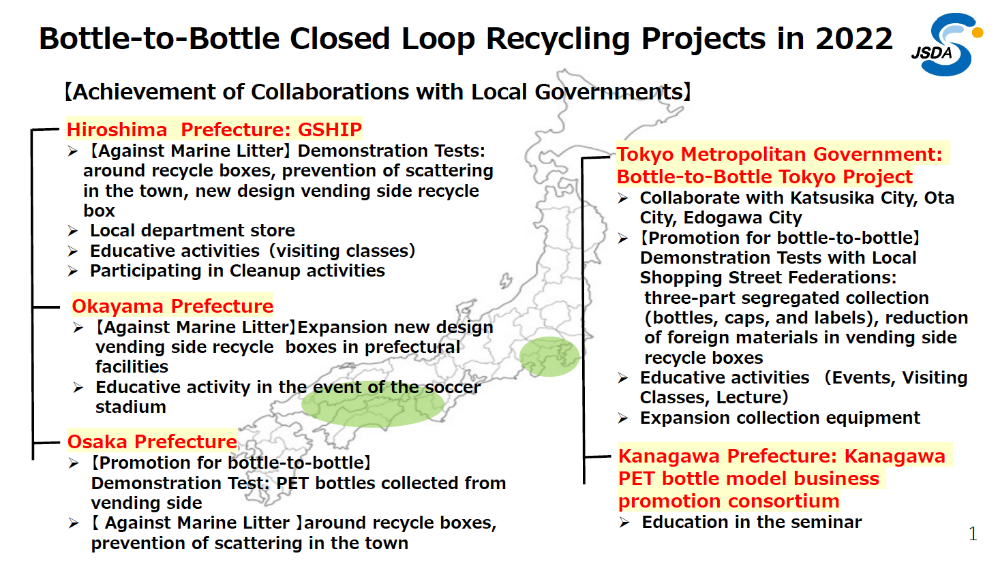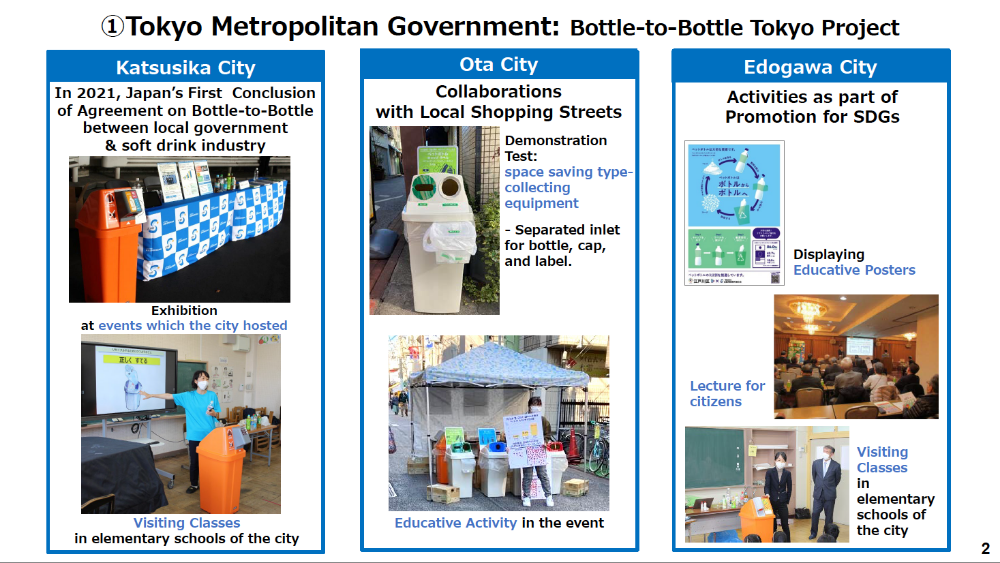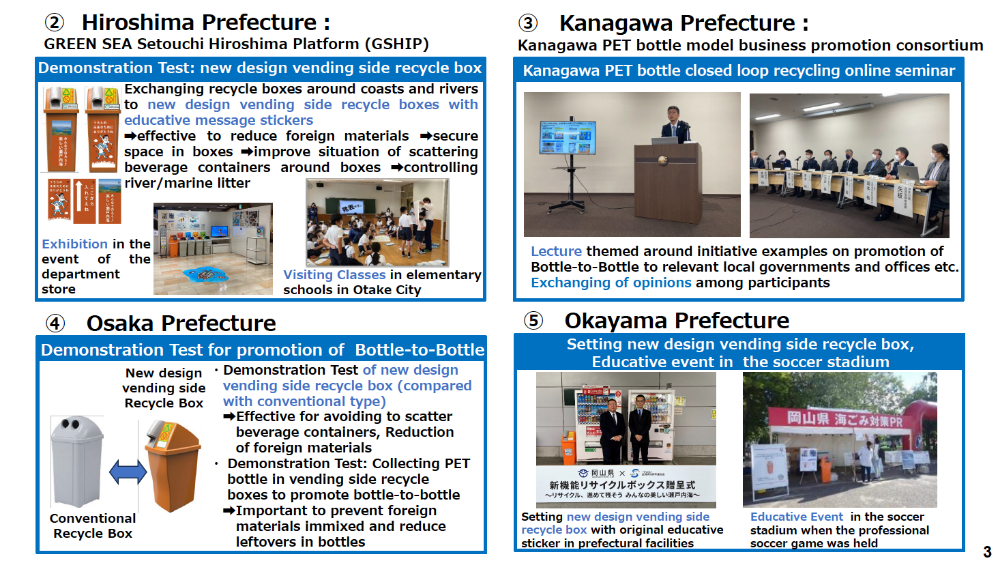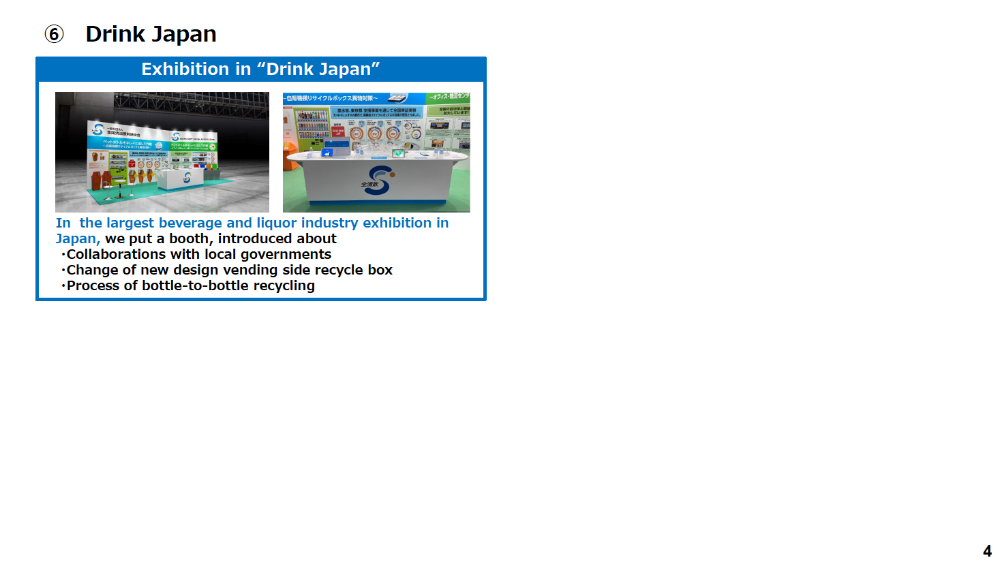Bottle-to-Bottle Closed Loop Recycling Projects in 2022
[Company / organization] Japan Soft Drink Association
Target Date and Target Content
Since 2020, beverage industry has implemented numerous activities to promote bottle-to-bottle recycling (Closed Loop Recycling) of PET Bottles. Our initiatives continue into 2022 where we continued promoting test events and educative activities focused on resource circulation and minimizing marine litter.
Technology and/or Business Model explanation
① Tokyo Metropolitan Government: Bottle-to-Bottle Tokyo Project
・ To promote bottle-to-bottle recycling, beverage industry participated in wide range of initiatives hosted by the local governments. Examples of such initiatives are:
(i) Providing educative booths in local government and community events.
(ii) Conducting on-site classes at elementary schools presented by our industry circular economy experts.
(iii) Testing effectives of new collection equipment with local area shopping associations, etc.
② Hiroshima Prefecture: GREEN SEA Setouchi Hiroshima Platform (GSHIP)
・ Jointly with Hiroshima Prefecture, the industry conducted initiatives to minimize outflow of PET bottles into marine water. Examples of such initiatives are:
(i) Field test of newly designed vending side recycle boxes with educative message stickers.
(ii) Educative collaboration event with a local department store.
(iii) Sustainability workshops in elementary schools in collaboration with local governments.
(iv) Field tests of segregated collection (separate collection of bottles, caps, and labels).
(v) Participation in cleanup activities hosted by Hiroshima Prefecture.
③ Kanagawa Prefecture: Kanagawa PET bottle model business promotion consortium
・ Participated as guest speaker in the seminar hosted by the prefecture titled “Kanagawa PET Bottle Closed Loop Recycling Online Seminar.” Seminar presentation covered the beverage industry initiatives to accelerate Bottle-to-Bottle closed loop recycling conducted jointly with local governments and public sector partners, followed by exchange of opinions among participants.
④ Osaka Prefecture -The experiment for the promotion of Bottle-to-Bottle closed loop recycling
・ Osaka Prefecture and the beverage industry are collaboratively seeking effective measures against the outflow of marine plastic waste and promotion of resource recycling. Field test was conducted in Osaka to verify the effectiveness of new design vending side recycle boxes and identifying the challenges toward PET bottle recycling process after collection.
⑤ Okayama Prefecture -Setting up new design vending side recycle boxes and implementing an educative activity around the soccer stadium-
・ As a measure against the outflow of marine litter, the industry collaborated with Okayama Prefecture to set up a field test of new design vending side recycle boxes. This test also included leveraging Okayama Prefecture’s original stickers to communicate the purpose of recycle boxes. Intended communication on the sticker was that vending side recycle boxes are for collecting used beverage containers and not for disposal of general garbage. Educative activity in the soccer (football) stadium was also conducted when the professional soccer game was held.
⑥ Participating in Drink Japan
・ Beverage industry booth was set up in the largest beverage and liquor industry exhibition in Japan, “Drink Japan,” and promoted understanding toward Bottle-to-Bottle closed loop recycling. Through the exhibition, we introduced collaboration initiatives with local governments, change in new vending side recycle boxes, and the process of Bottle-to-Bottle closed loop recycling.
Specific achievements and/or Target
① Tokyo Metropolitan Government
・ Katsusika City
The industry introduced our Bottle-to-Bottle closed loop recycling projects in events that Katsushika City hosted, and promoted participants’ consciousness about recycling. In visiting school classes, we explained to the students about the importance of proper segregation upon disposal. The school visit contributed in children’s consciousness regarding recycling.
・ Ota City
The industry collaborated with local area shopping associations and implemented experimental tests for three-particle segregated collection (PET bottles, labels, and caps). Based on the field needs, space saving type-collecting equipment that will allow three-particle segregated collection was made available. The effectiveness of the three-particle segregated collection equipment was confirmed through the test. In parallel, the new design vending side recycle boxes were also introduced at the site, which once again proved effective for reducing foreign particles. On top of the above, the industry cooperated in setting up booth events with local area shopping associations, in which the industry promoted the understanding toward Bottle-to-Bottle closed loop recycling.
・ Edogawa City
Through school visits and educative posters, the industry promoted understanding toward Bottle-to-Bottle closed loop recycling.
② Hiroshima Prefecture
・ The industry implemented field test of recycle boxes around coasts and rivers which has potential risk of leading to river/marine litter if there was an overflow of collected PET bottles from the recycle boxes. On top of the normal field test, educative label was pasted on the exterior of the recycle boxes to communicate our intent. Test results were encouraging where situation around boxes regarding scattering wastes improved. Based on this positive result, Hiroshima Prefecture made the decision to promote the expansion of new design vending side recycle boxes installation in the prefecture. For the promotions at department stores, the industry believes that participants’ consciousness toward marine litter and how PET bottle recycling is contributing toward the issue was obtained. School classes visits in all elementary schools of Otake City was conducted and provided students not only opportunities to learn about PET bottle recycling but also a chance to think about recycling in a more proactively way through group workshops.
③ Kanagawa Prefecture
・ Our initiative to participate as guest speaker in the seminar “Kanagawa PET bottle closed loop recycling online seminar” obtained encouraging response from the audience. Participants were highly interested in the industry’s past initiatives and its positive results. The number of questions asked at the seminar represents the high interest toward the subject. Through the seminar, the industry believes that participants’ comprehension toward bottle-to-bottle closed loop recycling was obtained.
④ Osaka Prefecture
・ In the tests of new design vending side recycle boxes, effectiveness toward reducing foreign particles was once again proved. As a result, risk of empty beverage container scattering around the recycle box minimized. Regarding the test to identify the challenges upon promoting bottle-to-bottle recycling with PET bottles collected from vending side recycle boxes, the test suggested the importance of preventing foreign particles to be mixed into the recycle boxes and reducing leftovers in PET bottles.
⑤ Okayama Prefecture
・ 57 new design vending side recycle boxes with Okayama Prefecture’s original stickers were implemented in prefectural facilities. In the educative event of soccer stadium, promotion to raise participants’ consciousness of recycling through the experience of throwing empty beverage containers into a new design vending side recycle box was conducted.
⑥ Participating in Drink Japan
・ Recorded satisfying number of visitors to the industry booth opened at “Drink Japan.” The booth worked well in gained interested toward the industry’s initiative toward bottle-to-bottle closed loop recycling. Especially, the exhibition panel showing the bottle-to-bottle closed loop recycling process was well received for being easy to understand.
URL references
① Tokyo Metropolitan Government: Bottle-to-Bottle Tokyo Project
② Hiroshima Prefecture: GREEN SEA Setouchi Hiroshima Platform (GSHIP)
http://www.j-sda.or.jp/ippan/news_view.php?kind=1&id=352
③ Drink Japan
- Recycle
- Design
- Production
- Distribution
- Utilisation
- End-of-use
- Plastics
- Company in same business category
- Company in different category.
- National government/ public institute
- Local government
- Currently under implementation (already in business)
